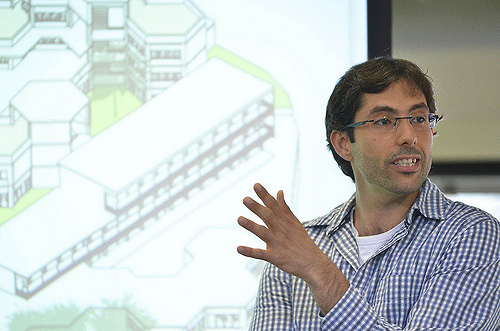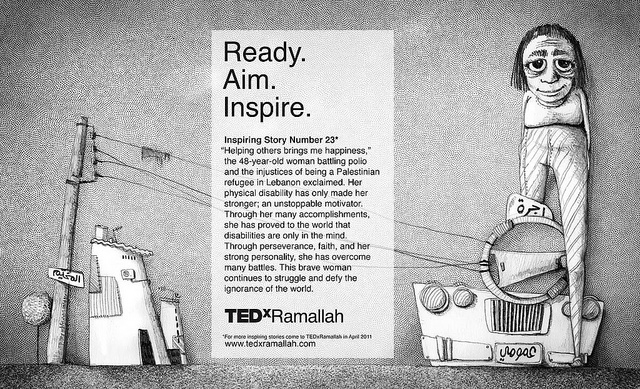Social Justice Pioneers through Technology: an interview with Ramzi Jaber
Author ········· Sadiqua Hamdan
Published ······ Online, January 2013
Section ······· Current Affairs
Published ······ Online, January 2013
Section ······· Current Affairs

Photo: Stanford University
When you think of countries on the forefront of technology and innovation in the world today, Jordan, Lebanon, Egypt and the Arab region as a whole are not the first that come to mind. Deeply rooted traditions, political conflicts and religious dichotomies are common themes associated with the Arab region that make mainstream headlines, but there is another narrative that has not been heard.
Creative people such as Ramzi Jaber are not only focusing on innovation and technology to create a new reality in their communities, but also redefining the application of these tools. Born in Jerusalem, Ramzi is a Palestinian from Ramallah in the West Bank. He obtained an engineering degree from Canada and found a job in structural design at firm based in the United Arab Emirates shortly after graduation. Upon embarking on putting together an independently organised TED event in Palestine, Ramzi says, “For the next year and a half I kept asking myself two questions over and over again: why are we in this mess? And who is doing something about it?”
The mess Ramzi speaks of is living in a region where rights are reserved for one ethno-religious group and the other group subjected to forms of colonialism, ethnic cleansing, and apartheid. This is manifested by one’s ethnicity dictating the colour of your license plate, which roads and buses you can use, where you can work and live. Horrific statistics such as 95 per cent of water in Gaza is unfit for human consumption due to the blockade with roughly 38 per cent of Gaza inhabitants live below the poverty line.
However, Palestinians like Ramzi are envisioning a better way of communicating their stories. The first such vision is TEDxRamallah, a spin-off to the illustrious annual TED conference, a non-profit dedicated to bringing people together from three worlds: technology, entertainment and design. The second project is Visualizing Palestine (VP), a startup that translates struggles and injustices by creating visual stories based from data and statistics produced by human rights organizations. These stories invite conversations and expose topics not in the mainstream, and give articulation to many voices that are unheeded. The third company is Thaber, a word that means to persevere in Arabic. Based on the science of behavioural economics, Thaber creates algorithms that assist with all types of decisions from consuming content to purchasing items.
TEDxRamallah: ready. aim. inspire.

SH | How did you become involved with TEDx?
RJ | TEDx started because of my love for design and knowledge. That’s my first experience with TED. It was something I watched online regularly. I went as far as putting an enormous amount of time and effort to apply to attend TEDIndia. While attending the conference, the organisers of [the] TED team saw that I had “Palestine” on my tag and they encouraged me to start TEDx in Ramallah. I was working full-time as a structural engineer and tried to do TEDx on the side, but then realised this project was going to be a huge undertaking. After interrogation on the border, I decided to quit my job in Dubai, move back home, and put all my effort into TEDxRamallah.
SH | What did you set out to accomplish by bringing TEDx to Ramallah?
RJ | There were two reasons [as to] why I wanted to create a TEDx in Ramallah. First, I wanted to I knew very little about Palestinians who were rallying for justice and a better life in Palestine. The world, as well as Palestinian diaspora, didn’t know about these social justice advocators and we wanted to be part of building a platform to amplify their voices. I also learnt, and this is true in many parts of the world, that wherever there is great adversity there are amazing inspirational people who rise up to the challenge.
SH | How did Palestinians react to the idea of TEDx coming to Ramallah?
RJ | I saw with TEDxRamallah a huge willingness for people from all around the world to go [through] such great lengths to be involved, donating their skills, time and money. At first, there was a little resistance to something that is unknown which is a natural reaction, but the speaker line-up is what really sold it to them. Some examples are: Raja Shehadeh founded Al-Haq, the first human rights organisation in Palestine that brought international law as a framework to stop the annexation of Palestinian land. Sheerin Al Araj is an educated Palestinian who quit her job and advocates on behalf of human rights in her native village of Al Walajeh when the apartheid wall was constructed. Khaled Al Sabawi is a Canadian-Palestinian engineer who became the first certified geothermal engineer in the Middle East. His quest is to “keep Palestine cool” by using geothermal energy.
SH | What impact, in your opinion, has TEDxRamallah had on the local community and those watching from the outside?
RJ | Awareness. Within these communities wonderful things are happening and their stories and voices are being heard, thanks to TEDxRamallah. This is a tool for those seeking knowledge, education, and resources; as well as wanting to connect with what is happening on the ground.
Visualizing Palestine: digital storytelling 2.0

SH | Where did the idea of VP come from and how did VP come to fruition?
RJ | When living in Ramallah, I was severely disappointed and shocked at my own ignorance of the huge amount of statistics that exist that describe the colonial situation in Palestine, I saw an opportunity to tackle a false narrative that is prevalent not only in the west but also included ignorance that exists among diaspora Palestinians and Arabs. Storytelling is a venerated Arab tradition and we wanted to augment it through harnessing the power of technology and design to create visual stories that reached a wide number of people. This platform is still in its early stage and is blossoming: one infographic went viral to over 136,000 people in less than six days. VP has now been featured in media outlets such as Al Jazeera, Huffington Post, Fast Co. Design, Jadaliyya and Mondoweiss.
VP also came to fruition because I was blessed by being surrounded with wonderful and stunningly talented people who can take these initiatives to whole other levels. People such as Joumana Al-Jabri, who also co-founded Visualizing Palestine and was co-[organiser of] TEDxRamallah, Ahmad Barclay who has unique skills in analysis, spatial design and research and [also] co-founder, Hani Asfour who co-founded Polypod in Lebanon, an award-winning multidisciplinary design firm, Naji El Mir, designer, typographer and animator par excellence, Tamara Ben-Halim who handles communication as well as many others.
SH | How does communication through social media bring about change?
RJ | A more relevant question to ask is, “how do you create tools for mobilisation, which translates into change on the ground?” Most social injustices happen because of an abuse of power. How do you challenge these structures of power? First, people have to fully understand the issue(s) at hand, want to challenge the abuse of power and know they are not alone in their quest. I find that the majority of people want to get involved, but don’t know how or think it’s too difficult to effect change. It’s not easy for people to sink their teeth in a social justice issue in their community, let alone a problem thousands of miles away.
SH | What issues have been addressed using this process?
RJ | VP is under the umbrella of Visualizing Justice. We started documenting issues that Palestinians in the West Bank and Gaza are facing, such as the displacement of homes, segregation of roads, and contaminated water in Gaza.
Thaber: [thaa bir]: to persevere
SH | Building one start-up company like VP is a challenge in itself, but why two companies?
RJ: Why not? There aren’t many opportunities in life to work on one project you’re passionate about. When the second opportunity came, I took it. I also partnered with Ahmad Ghunaim who is one of the most talented developers I have ever worked with in my life. Thaber and VP have a lot of synergy and I can see them being intertwined in the future.
SH: What does Thaber do?
RJ | Thaber is a company that focuses on creates products creating algorithms that make decisions for you, using the science of behavioural economics. We live in societies where decisions are made through our networks. If a friend recommends reading a specific book or using a certain service, you are more likely rely on your friend’s recommendations to purchase products and services. We’re taking that concept online. Websites traditionally use previous history to give recommendations (You can see this on Amazon.com – You’ve read a book on design, here’s another book on design). Our model for recommendation on content is through utilising the immense amount of data through tapping into the social networks already established such as Facebook, Google Plus, Twitter, LinkedIn, etc. The algorithm will either be used by content or service providers (such as Amazon, TED.com, etc) or will be viewed through a platform that will be built by June 2013.
SH | What challenges did you face with this start-up?
RJ | Start-ups face many challenges, but they face more difficulties in the Arab world. We don’t have the support systems in place that exist in massive quantities in the US, where there are incubators, small business loans, grants, mentorship, access to resources, etc. Wamda is one of the few exciting newcomers in the Middle East North Africa region, designed to empower entrepreneurs and support with media, funds and organisational management.
There’s also a brain drain in our area. Most highly educated [Arabs] in this industry have studied abroad and do not stay in the [Arab region]. Technology’s potential to impact and affect change is not widely understood in this part of the world. Despite these challenges, it is a growing and exciting field to be in right now.
Sadiqua
Hamdan is the founder of Sharp Thinking Communications, an organisation
committed to promoting cultural and business endeavors within the
Middle East through education. She is a published writer, entrepreneur
and lifelong learner. Her book Palestinian Women: Rising Above
Limitations, Expectations and Conditions is due to be published in early
2013. www.sharpthinkingcommunications.com • www.palestinianwomenrising.com
